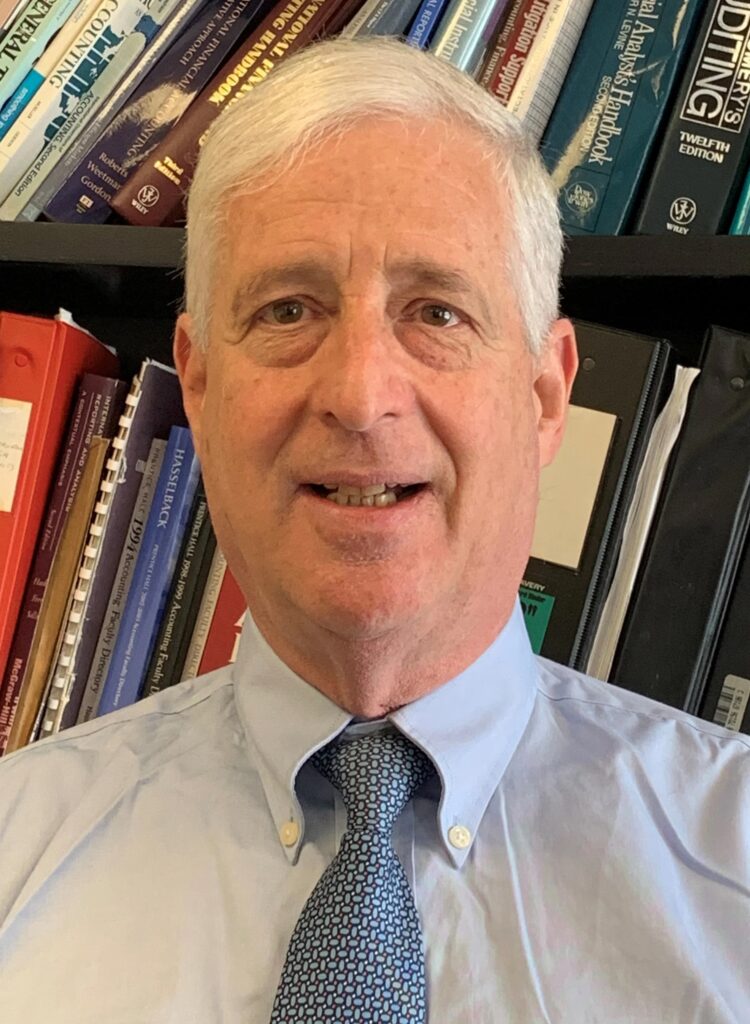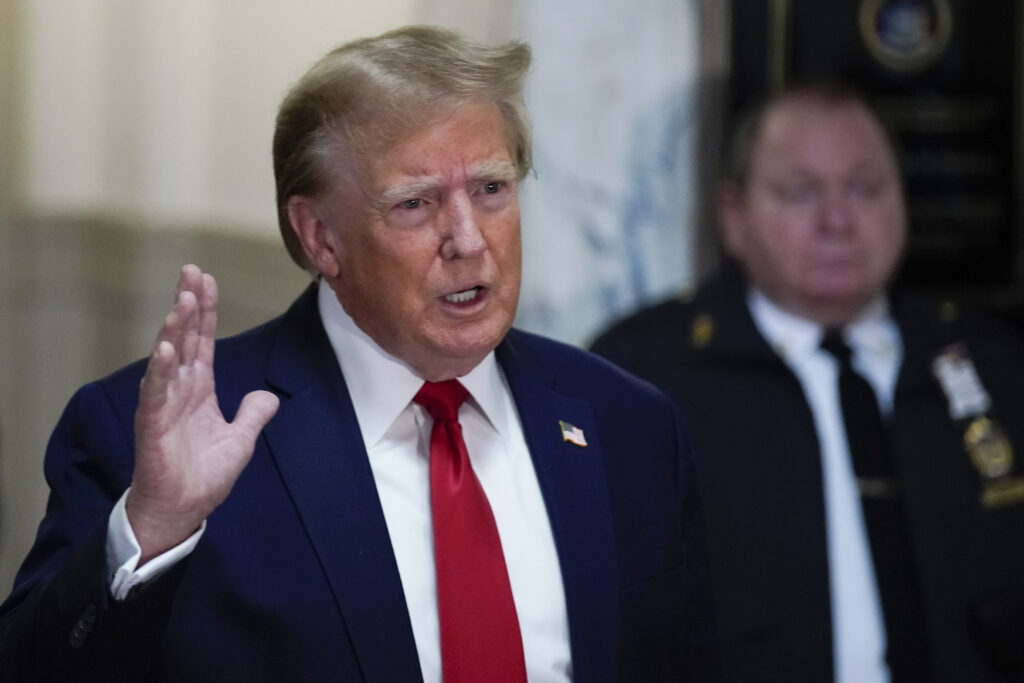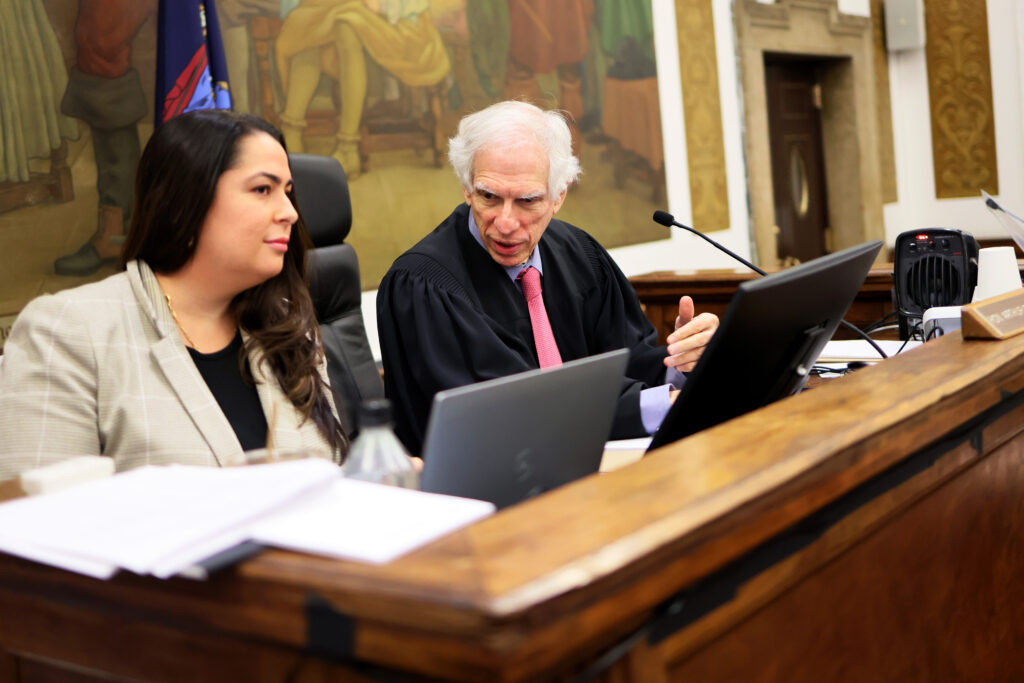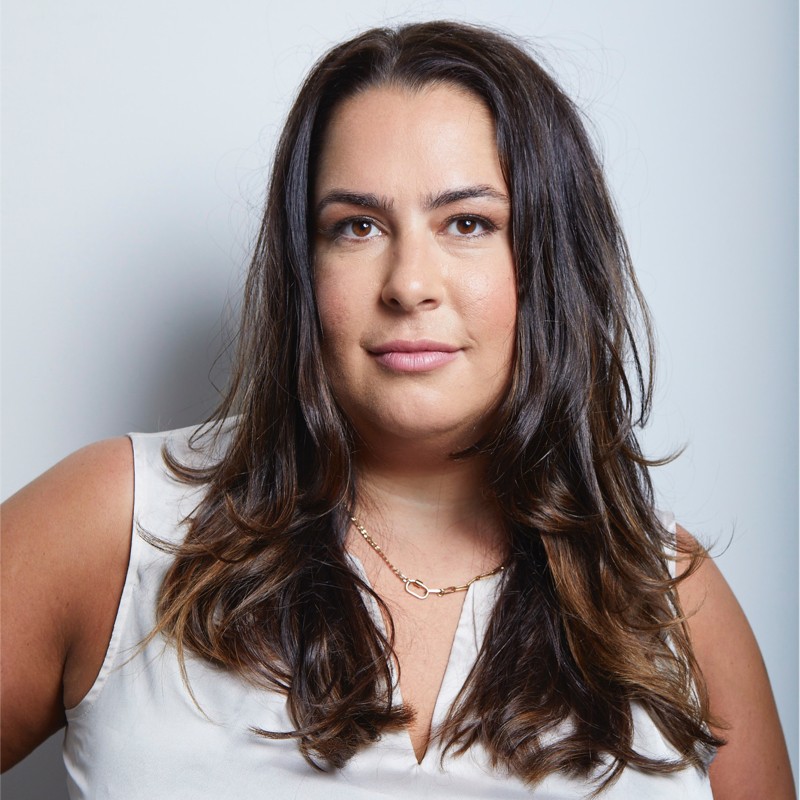‘You Should be Ashamed of Yourself’: Expert Witness Denounces Prosecutors in Trump Fraud Case, Claims They ‘Made Up Allegations’
A NYU business school accounting professor tells the court that ‘there is no evidence whatsoever of any accounting fraud.’

An expert witness blasted the civil fraud case against President Trump and his business empire on Thursday.
“You really ought to be ashamed of yourself,” a professor of accounting at New York University’s Leonard N. Stern School of Business, Eli Bartov, loudly declared from the witness stand.
Mr. Trump was in the courtroom, sitting at the defense table, attentively listening when the witness raised his voice at a senior counsel from the attorney general’s office.
“You make up allegations that never existed,” the professor fumed. “I am here to tell the truth. You should be ashamed of yourself, talking to me like that.”

New York’s attorney general, Letita James, is suing Mr. Trump, his two adult sons, as well as two of his former employees, and several of his companies, alleging that the Trumps fraudulently inflated the value of their buildings, hotels and golf courses in order to gain favorable loans and insurance policies. Ms. James seeks over $250 million in damages.
In a pre-trial decision, Judge Arthur F. Engoron already found the defendants liable for fraud. The attorney general, Mr. Engoron wrote, had submitted sufficient evidence that between the years 2014 and 2021, the overvalued assets amounted to a “discrepancy between $812 million and $2.2 billion.”
“Defendants have failed to identify any authority for the notion that discrepancies of the magnitude demonstrated here could be considered immaterial,” the decision reads. The submitted “evidence is not a matter of rounding errors or reasonable experts disagreeing.”
Six other legal claims remain to be ruled on. These include submitting false financial records, insurance fraud, and conspiracy.
Yet on Thursday, the expert witness for the defense disagreed vehemently. “People that don’t know accounting can think this is all fraud,” Mr. Bartov explained. “My main finding is that there is no evidence whatsoever of any accounting fraud.” He said he thoroughly reviewed the Trump Organization’s statements of financial condition, and his analysis showed that they “were not materially misstated.”
“So your expert opinion is, from an accounting perspective, the attorney general’s complaint had no merit?” Judge Engoron asked.
“Absolutely, my opinion, absolutely,” Mr. Bartov reinforced. “There is not a single reference to a violation of any accounting provision.”
If Mr. Trump were his student at NYU, the professor said, he would get an “A” on his statements of financial condition. “I’ve never seen a statement that provides so much detail and is so transparent as these statements.”
Mr. Bartov conceded that the value of Mr. Trump’s penthouse in Trump Tower at Manhattan had indeed been “inflated” in his financial statement, but he described the discrepancy as “an error in the calculation,” and emphasized that “it’s not fraud,” and “not unusual.”
“The number one fraud is concealment,” he added, and the Trump Organization had not concealed anything. On the contrary, he said, numerous pages of notes attached to their statements provided the banks with additional details. Before banks hand out loans, the accountant said, “they have to perform credit analysis and that is based on financial information and one source is the statement of financial condition, but the statement contains 20 pages and not two pages.”

Two attorneys for the state, Kevin Wallace and Louis Solomon, frequently objected, stating that Mr. Bartov was not a banker, and had not been qualified as an expert in credit analysis.
The professor was unphased. Even when the judge reminded him that the courthouse is “not a classroom,” and his testimony “not a lecture,” he continued to give lengthy explanations, repeating that banks don’t rely on financial statements when calculating their loans. Instead, they “prepare their own statements. They didn’t use the numbers that were reported in the SOFCs. All the credit lenders are the same.”
When Judge Engoron asked him, “why get the numbers in the first place?” the accountant said they provided “context.”
“It is impossible to argue, it is really absurd to argue, that Deutsche Bank or any bank or any lender would make lending decisions based on the SOFCs,” the professor concluded. “This should close the book on this case.”

Mr. Bartov, who had lauded himself during an hour of testimony solely dedicated to examine his numerous qualifications, publications and accolades, including an annual phone call from the Nobel prize committee, soliciting his professional opinion to select economists as nominees, appeared confident until an objection from Mr. Wallace triggered his emotional outburst.
The prosecutor interrupted his testimony, paraphrasing it as “pure speculation from someone” the defense had hired “to say whatever it is they want.” Mr. Wallace was referring to a deposition, in which the professor told the state attorneys that the Trump Organisation had paid him $520,000 to conduct his assessment.
Mr. Trump called Mr. Bartov, “a highly respected man,” when he spoke to reporters in the hallway during a break. “I don’t know him, but he’s an expert witness and he found no fraud whatsoever.”
Thursday marked Mr. Trump’s ninth appearance at the Manhattan State Supreme Court in the high-profile case. Last month, the state had called the former president to the witness stand, where he proclaimed in a fiery speech that the “fraud is on the court,” not on him.
Mr. Trump had come to the courthouse with his son, Eric, who is also charged in the case. Eric had originally been scheduled to take the stand on Wednesday, but the defense attorneys reversed their decision.

“Eric has already testified, PERFECTLY…so there is no reason to waste any more of this Crooked Court’s time on having him say the same thing, over and over again, as a witness for the defense (us!),” Mr. Trump posted on his social media platform, Truth Social, on Tuesday evening. “His young life has already been unfairly disturbed and disrupted enough on this corrupt Witch Hunt.”
President Trump will testify on Monday, as the final witness for the defense. Earlier this week, his attorney, Chris Kise, had asked Judge Engoron if he would allow the postponement of Mr. Trump’s testimony until the disagreement over a gag order placed on him and his attorneys is resolved.
“He is not capable of fully testifying because he is subject to the gag order,” Mr. Kise told Judge Engoron.
“Absolutely not. No way, no how. It’s a non-starter,” Judge Engoron replied. “If he is going to testify, it’ll be Monday, and that’s that.”
Judge Engoron imposed partial gag orders on Mr, Trump earlier in the trial, and later extended them to include his legal team, after they extensively criticized his principal law clerk, Allison Greenfield, whom they accused of bias, inappropriate behavior and “co-judging.” The gag orders were temporarily lifted by a higher court, but then reimposed. Mr. Trump is continuing to appeal for the right to criticize Ms. Greenfield.
In a more favorable turn of events for the Trump Organization, a panel of judges on the court of appeals ruled on Thursday that Mr. Trump’s business licenses would remain intact while the trial is ongoing. Judge Engoron had previously granted Ms. James’ request to install an outside monitor to oversee Mr. Trump’s New York businesses.
Mr. Trump praised the decision, telling reporters, “Also the judge, as you know, was rebuked in that he was overturned by the appellate division of the New York State Supreme Court, which is a higher court, much higher court than where we are right now.”
After President Trump’s testimony on Monday, the defense will rest its case. Lawyers for the attorney general’s office have announced two more witnesses for Tuesday. The closing arguments are scheduled for the new year, on January 11. Judge Engoron told the attorneys that he will likely issue a written decision in the weeks after that.

